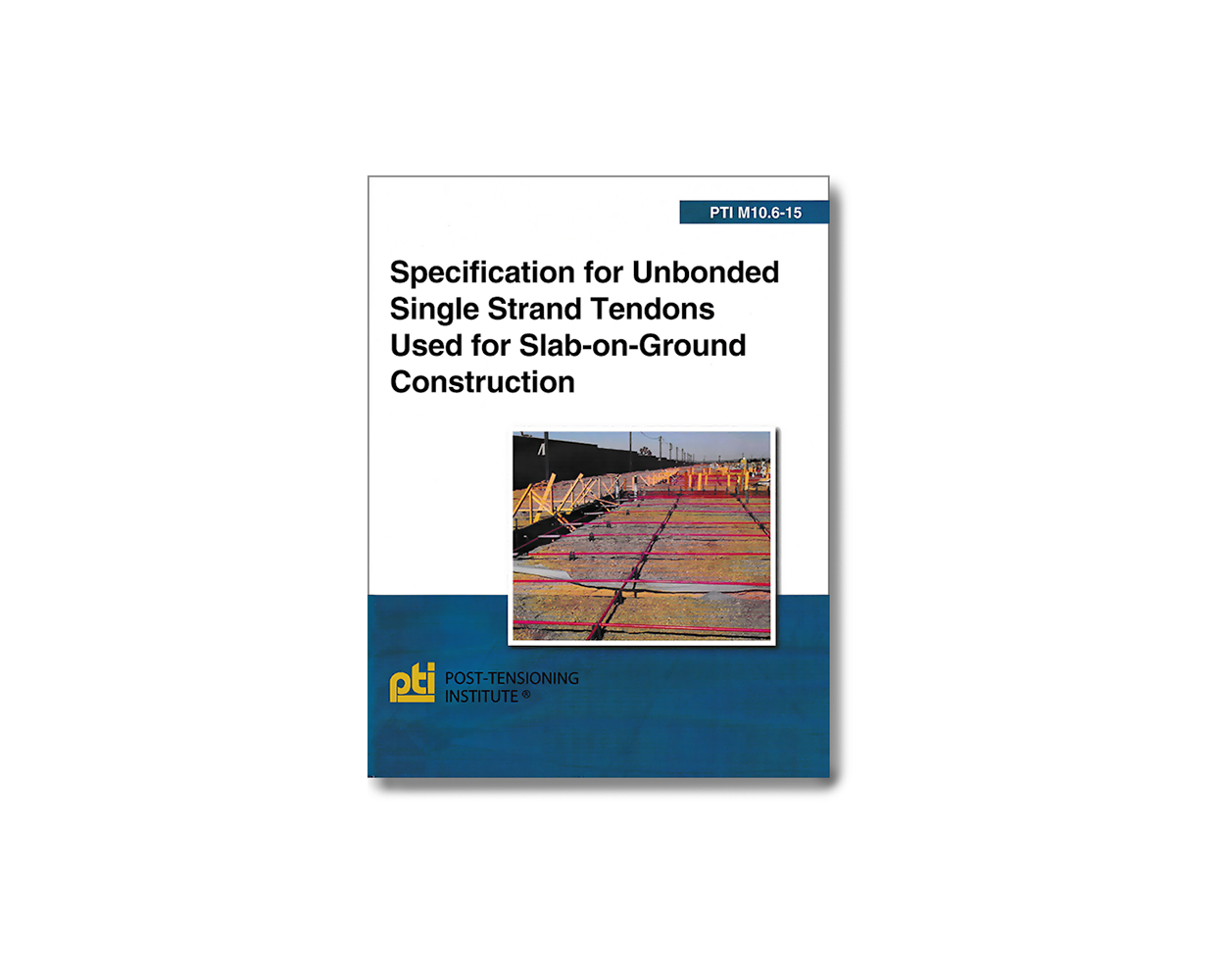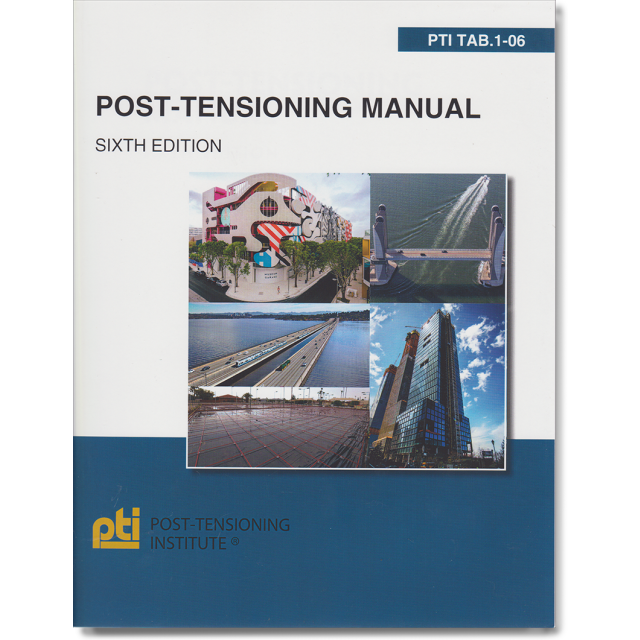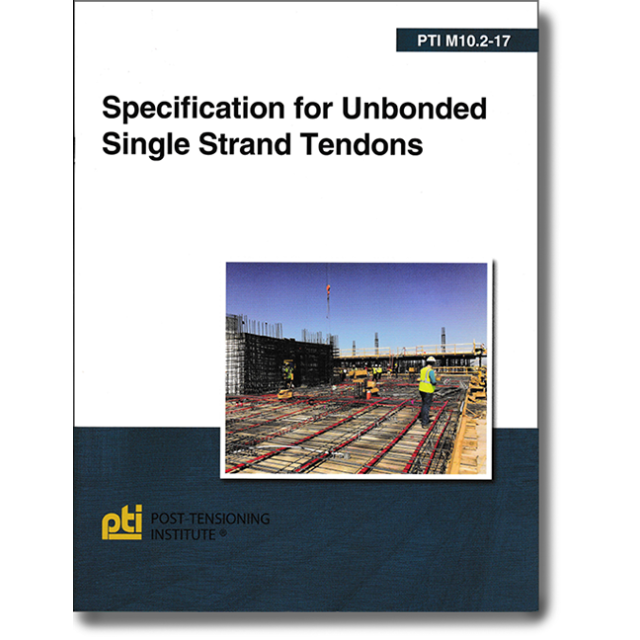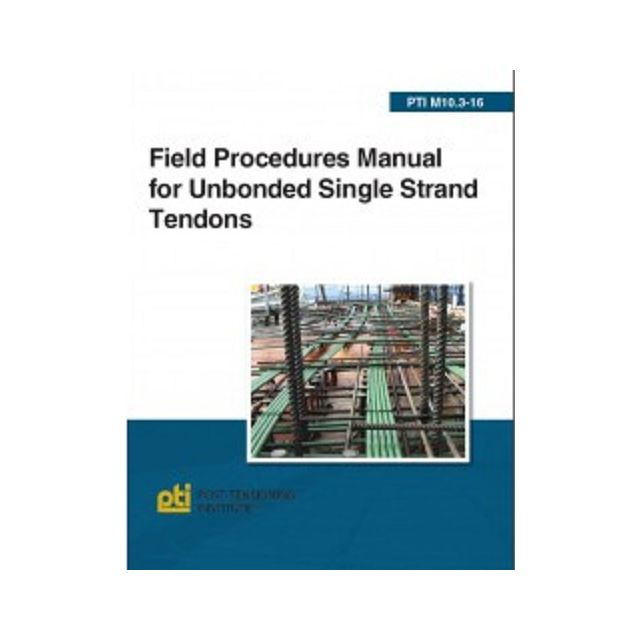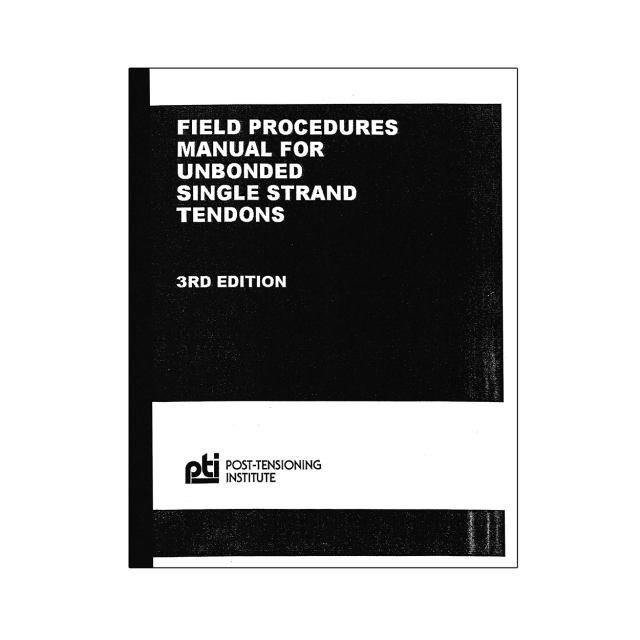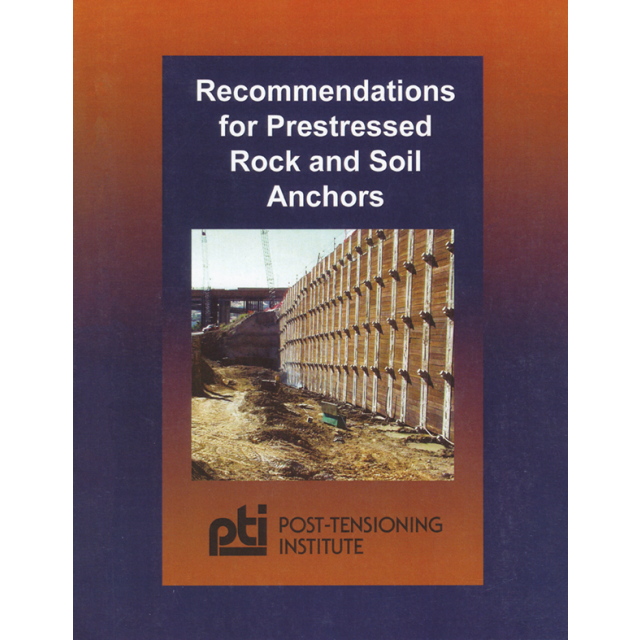PTI M10.6-15: Specification for Unbonded Single Strand Tendons Used for Slab-on-Ground Construction
PTI M10.6-15: Specification for Unbonded Single Strand Tendons Used for Slab-on-Ground Construction
This specification provides performance criteria for materials and detailed recommendations for the fabrication and installation of unbonded single strand tendons specifically used in any application of slab-on-ground construction using unbonded post-tensioned reinforcement. Specifications are presented for both “standard” and “encapsulated” unbonded single-strand tendon systems.
Publisher: PTI/2015/35 pages/8½ x 11 in. (soft cover)/ISBN No. 9780870319488
| Price | $169.95 |
|---|---|
| Customer Service | Customer ServiceWe're Here To Help Call us anytime during our customer service hours... Monday through Friday - 8:30 am to 4:30 pm (Pacific) Order Questions: TOLL FREE, 800-273-7375 (Outside the U.S. call 818-887-7828). Our Address: 8001 Canoga Avenue Canoga Park, CA 91304 US Phone: 800-275-2665 E-mail: sales@buildersbook.com
|
| Description | PTI M10.6-15: Specification for Unbonded Single Strand Tendons Used for Slab-on-Ground Construction This specification provides performance criteria for materials and detailed recommendations for the fabrication and installation of unbonded single strand tendons specifically used in any application of slab-on-ground construction using unbonded post-tensioned reinforcement. Specifications are presented for both “standard” and “encapsulated” unbonded single-strand tendon systems. TABLE OF CONTENTS 1.0 — General 1.1 — Scope 1.2 — Definitions 1.3 — References 1.3.1 — Referenced standards and organizations 4 1.3.2 — Cited publications 1.4 — System description 1.5 — Submittals 1.5.1 — Prestressing steel 1.5.2 — Anchorages and couplers 1.5.3 — Sheathing 1.5.4 — PT coating 1.5.5 — Fabrication plant 1.5.6 — Stressing records 1.6 — Fabrication 1.6.1 — General 1.6.1.1 — PTI certified plants 1.6.1.2 — Non-PTI certified plants 1.6.2 — Handling, storage, and shipping 1.6.2.1 — Handling prior to shipping 1.6.2.2 — Storage prior to shipping 1.6.2.3 — Shipping 1.7 — Delivery, handling, and storage 1.7.1 — Delivery 1.7.2 — Handling and storage 1.7.2.1 — Handling 1.7.2.2 — Storage 1.7.2.3 — Exposure 1.7.2.4 — Wedges and anchors 2.0 — Products 2.1 — Prestressing steel 2.1.1 — Mechanical properties 2.1.2 — Thermomechanical treatment 2.1.3 — Traceability 2.1.4 — Testing 2.1.5 — Strand producer records 2.1.6 — Identification 2.1.7 — Packaging, marking, storage,and protection 2.1.8 — Acceptance criteria for surface condition 2.1.9 — Compliance requirements 2.2 — Anchorages and couplers 2.2.1 — Anchorages 2.2.1.1 — Static tests 2.2.1.2 — Fatigue tests 2.2.1.3 — Bearing stresses 2.2.2 — Castings 2.2.3 — Wedges used in anchorages 2.2.4 — Couplers 2.2.5 — Compliance requirements 2.2.5.1 — Conformance testing 2.2.5.2 — Compliance 2.2.6 — Anchorages and couplers in aggressive environments 2.2.6.1 — Anchorages 2.2.6.2 — Encapsulated tendons 2.3 — Sheathing 2.3.1 — General properties 2.3.2 — Minimum thickness and diameter 2.3.2.1 — Minimum thickness 2.3.2.2 — Inside diameter 2.3.2.3 — Appearance 2.3.3 — Fabrication process 2.3.4 — Sheathing coverage 2.3.5 — Encapsulated tendons 2.4 — PT coating 2.4.1 — General properties 2.4.2 — Type of PT coating 2.4.3 — Minimum quantity 2.4.4 — Performance criteria 3.0 — Execution 3.1 — General 3.1.1 — Qualifications and inspection 3.1.2 — Recommended procedures 3.1.3 — Handling 3.1.4 — Protection 3.2 — Tendon installation 3.2.1 — General 3.2.1.1 — Support intervals 3.2.1.2 — Support system 3.2.1.3 — Tendon tolerances 3.2.1.4 — Lateral deviations 3.2.1.5 — Protection 3.2.1.6 — Protection from water 3.2.1.7 — Encapsulated tendons 3.2.2 — Stressing anchorages 3.2.2.1 — Installation 3.2.2.2 — Attachment requirements 3.2.2.3 — Cover requirements 3.2.2.4 — Pocket formers 3.2.2.5 — Encapsulated tendons 3.2.2.6 — Strand tail cover 3.2.3 — Intermediate anchorages 3.2.3.1 — Installation 3.2.3.2 — Placement 3.2.3.3 — Cover requirements 3.2.3.4 — Pocket formers 3.2.3.5 — Encapsulated tendons 3.2.4 — Fixed anchorages 3.2.4.1 — Installation 3.2.4.2 — Wedge seating methodsfor fixed anchorages 3.2.4.3 — Placement 3.2.4.4 — Encapsulated tendons 3.2.5 — Sheathing inspection 3.2.5.1 — Sheathing damage 3.2.5.2 — Repair procedure 3.3 — Concrete placement 3.3.1 — General 3.3.2 — Placement 3.3.3 — Protection of tendons 3.3.4 — Sheathing repairs 3.4 — Tendon stressing 3.4.1 — General 3.4.1.1 — Protection from water 3.4.1.2 — Stressing procedures 3.4.1.3 — Stressing jacks 3.4.2 — Jack calibration 3.4.3 — Elongation measurements 3.5 — Tendon finishing 3.5.1 — General 3.5.1.1 — Cutting of tendon tails 3.5.1.2 — Cutting methods 3.5.2 — Encapsulated tendons 3.5.3 — Stressing pockets 3.5.3.1 — Preparation 3.5.3.2 — Timing Publisher: PTI/2015/35 pages/8½ x 11 in. (soft cover)/ISBN No. 9780870319488
|

